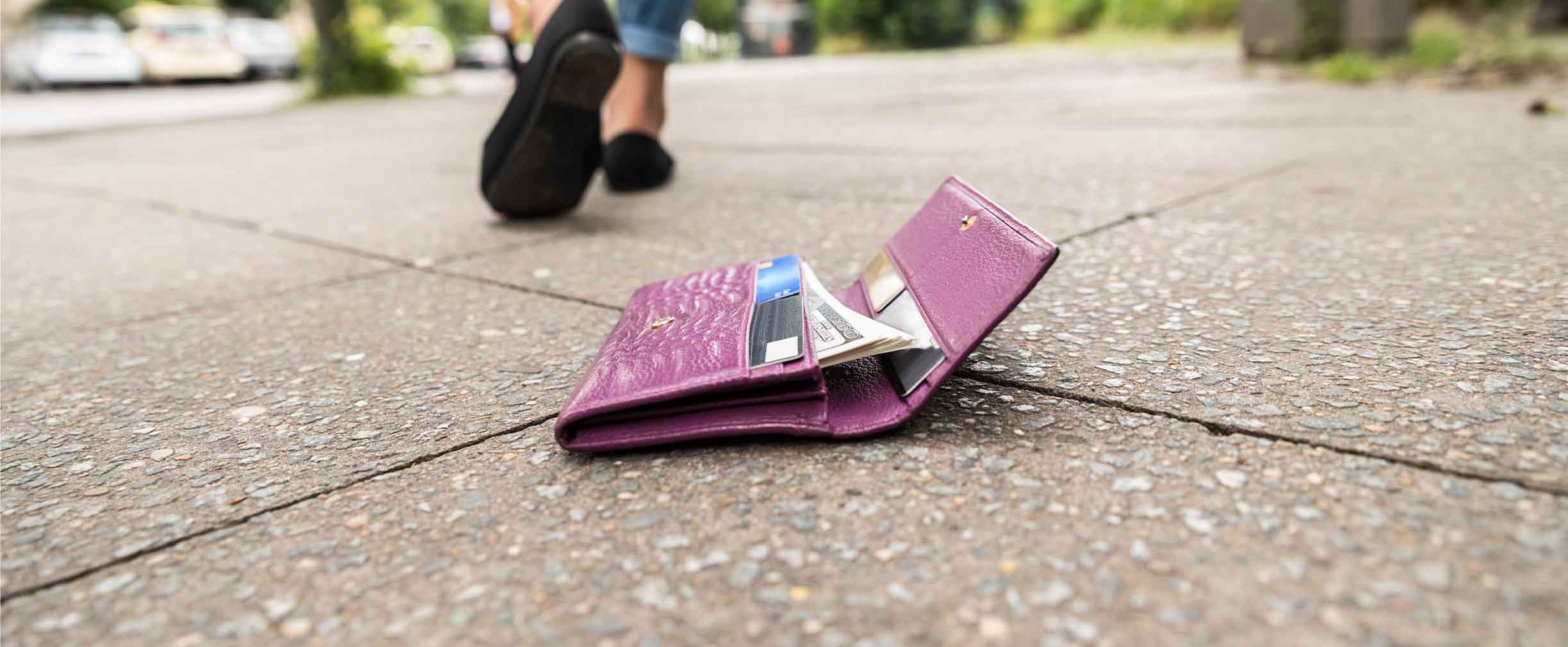Take these steps immediately to prevent credit or debit card fraud and protect your identity.
It’s a sinking feeling. You’ve searched your bag, your home and your car. You’ve retraced your steps. You’ve looked everywhere. Your wallet is gone.
While losing a wallet may not be as big of a nightmare these days as losing your phone, it’s stressful, can cost you time and money, and makes you vulnerable to identity theft.
Stay calm and get to work right away on rectifying the situation. Here’s what to do if your wallet is lost or stolen.
-
Call your bank immediately
Your bank can suspend or cancel your credit or debit card, watch your account for fraudulent charges and issue you a replacement card with a new number.
You should also review any recent charges on your credit or debit card—either on a call with your bank or online. Unfamiliar charges can indicate a stolen card versus one that is simply lost.
-
Call each of your credit card companies immediately
Federal regulations protect consumers from all unauthorized charges made after a credit card is reported as lost or stolen, so take action immediately. Go to your credit card company’s website to find the phone number to use in the case of lost or stolen cards. Some banks, including Regions, allow customers to freeze their card from being used on their mobile app.
If you don’t have your account number (as it’s not listed on statements), be prepared to give other information, such as your Social Security number, to verify your identity. Your credit card company will suspend the old cards and send you replacements with new numbers.
-
Report the loss to the police
Contacting the police is a worthwhile step, but it’s less about actually finding your wallet than protecting your identity. By filing a police report, you’ll have firm proof of the exact time your data was compromised in case of future identity theft.
Make sure to also share with the police if the cards have been used since they left your control. That’s credit card fraud.
-
Report your missing license to the DMV
Letting your local department of motor vehicles know that your ID was stolen can protect you from identity theft. Go online to your state’s DMV website to find out the steps to take to report and replace your license. (If you have a police report, you might also be able to replace your license for free, rather than paying a fee.)
-
Call the Social Security Administration and IRS Identity Protection Specialized Unit
It’s not recommended to keep your Social Security card in your wallet, but if you do and it was stolen or lost, call the SSA and the IRS Identity Protection Specialized Unit to inform them as soon as possible.
-
Freeze your credit
A credit freeze ensures no one can open new accounts in your name. (Remember, a wallet thief might have your birth date and address just from your ID alone.) Contact the credit reporting agencies—Equifax, Experian and TransUnion—to freeze your credit and to make sure there are no fraudulent charges or new accounts on your report. You can also ask for an ongoing fraud alert on your account.
-
Track your accounts
Keep monitoring your credit card accounts and bank accounts for any sign of fraudulent activity. (To keep an eye on your credit, get a free copy of your credit report every 12 months from each credit reporting company using annualcreditreport.com.) Make sure to check on your monthly bills as well. You may need to update any automatic transfers that used your old card numbers.
-
Report any indication of identity theft
Signs of identity theft include bills for items you never purchased, calls from debt collectors, missing mail and accounts you never opened showing up on your credit report. Learn more about how to report identity theft.
-
Watch out for scammers
Remember, your bank and your credit card companies will never call you and ask for personal information over the phone. Be mindful that fraudsters may impersonate government agencies, too. Hang up on any suspicious call immediately even if they have information such as your birthdate or Social Security number.
If you do get a scam call or email, call your bank or the relevant organization to let them know, using a phone number you find on the bank’s website. Never call back a phone number that cold calls you, as scammers can spoof outgoing calls, too.
-
Future-proof your wallet
Take steps now to minimize the pain if this ever happens again. Carry as few credit cards as possible: Maybe that specialty store card doesn’t need to be with you at all times, for example. Never keep a PIN with your credit or debit cards. And always carry your keys separately from your wallet. It’s also a good idea to make a list of your cards and keep it in a secure place at home. (Leave your account numbers off.) Catalog the issuers’ contact information so you can easily report lost or stolen cards in the future.
Start today
- Read more: Tips to prevent credit card fraud.
- Learn more: What identity theft is—and how to avoid it.
- Take action: Block transactions on your Regions cards.










